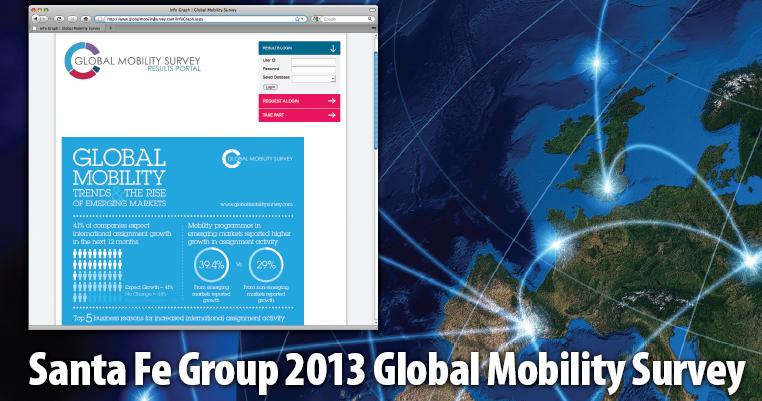The Global Mobility Survey, commissioned by Santa Fe Group and performed by Circle Research is the largest annual analysis of international mobility programmes.

The Global Mobility Survey, commissioned by Santa Fe Group and performed by Circle Research is the largest annual analysis of international mobility programmes. The 2013 report says that more businesses are decentralising global mobility operations and adopting more regional approaches to how they manage their mobility programmes.
The study surveyed 1,273 companies across a range of industries in 70 countries and found more growth in mobility programmes managed from emerging markets compared with programmes managed from non-emerging markets. The study also found that three quarters of companies say that emerging markets are important to their mobility programme; one third go so far as to describe them as very important.
Experts interviewed in conjunction with the report cite reasons for this trend including a changing marketplace, improved skill sets in emerging markets, economic challenges in the West, accelerated growth in Brazil, India and particularly China, and sheer volume of assignments in and out of regional locations.
Emma Gibbs is the Director of The Expat Academy. “Often organisations have regional global mobility teams where there is a critical mass of employees moving into or out of a region,” she said. “This justifies the headcount and allows the global mobility managers face-to-face time with employees, removing the challenges posed by time zone differences.”
Peggy Smith, President /CEO of Worldwide ERC said that for companies unfamiliar with a region in which they wish to do business, outsourcing provides a number of advantages, that might include payroll and benefit administration, recruiting and hiring support, employee assignment coordination, immigration, transportation, and communication. “But one of the most critical areas where outsourcing supports the company is to provide a ‘boot on the ground’ representative to address company needs and to communicate issues back to the corporation.”
Brian Friedman, Founder and CEO of the Forum for Expatriate Management acknowledge that we are operating in a fast-changing world. “The world is changing and its centre of gravity is moving east,” he said. “Today’s economic powerhouses of India and China are increasingly becoming headquarter locations rather than the far-flung outposts of yesteryear.”
Peter Reilly, Director HR Research & Consultancy,
Institute for Employment Studies pointed out that the benefits of outsourcing have been especially relevant in international mobility programmes where practices between locations have differed for no good reason and this inconsistency has become apparent for serial expatriates. “Delegation control of mobility programmes to a regional unit makes sense when either movement is confined to a region, or where there is a regional scheme (with different terms and conditions) running in parallel to a global scheme,” he said.
Maury Peiperl, Professor of Leadership and Strategic Change, at the IMD in Switzerland urges companies to look at wider considerations than simply cost analysis. “Of course, expanding into new markets demands an analysis of costs, risks and the opportunity,” she said. “Beyond this though, it’s important to consider the role of ‘connected-ness.’ The presence of geographical, economical or cultural connections an organisation has tends to skew expansion in ways beyond what might be merely economically advantageous.”
Other highlights in the market identified in the Global Mobility Survey include:
- 41 percent of companies expect assignments to increase in the next 12 months.
- Retail, pharmaceuticals, and oil and gas are the industry sectors largely driving growth.
- China, India and Brazil were ranked as the most challenging destinations.
- Hardship locations are dominated by the emerging markets, with enhanced packages provided by most companies to support employees on these assignments.
Andrew Dalglish, Director of independent research company Circle Research, commented: “The subject of emerging markets has dominated the headlines and has prompted additional research into this area. The results of the Global Mobility Survey research show that traditional growth markets still present significant challenges to mobility programmes and that new frontier locations in Asia, South America and Africa look set to bring their own set of unique circumstances. This study provides highly compelling information for any global mobility programme touching these areas.”
Across global mobility, companies reported expansion within existing markets, expansion within new markets, local skill shortages, talent development and mergers & acquisitions as the major reasons for overall growth. Along with major trends in global mobility, the survey also reports on assignment packages, management team structures, use of technology and investigation of compliance. The report also features an expert panel forum with key figures from the global mobility industry.
Mike Brazier, Global Mobility Survey Research Editor, commented: “The Global Mobility Survey continues to provide new and detailed insight into key mobility trends for international relocation experts. We are particularly grateful of everyone who has participated in this body of research and our expanded panel of experts who have added their additional thoughts. We hope everyone finds the report, the infographic and the web portal useful for benchmarking their own programmes.”

www.globalmobilitysurvey.com Click here to read the next Editor's pick